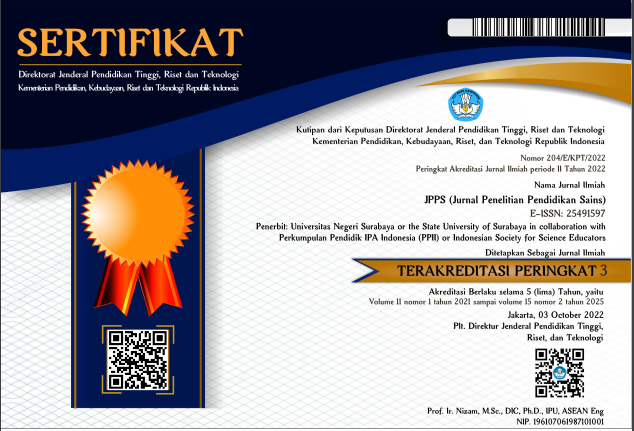COMPARATIVE STUDY OF EFFECTIVENESS BETWEEN INQUIRY LAB AND GUIDED INQUIRY LEARNING MODELS TO IMPROVE STUDENTS’ HIGHER ORDER THINKING SKILLS
DOI:
https://doi.org/10.26740/jpps.v11n1.p12-26Keywords:
Conventional, Guided inquiry, HOTs, Laboratory inquiryAbstract
The research aims to describe the improvement of students’ Higher Order Thinking Skills (HOTs) and compare the differences in effectiveness between the two levels of the inquiry learning model. Two types of learning model levels were applied in this research, namely the Inquiry Lab and Guided Inquiry learning models. This research took place on Fluid Mechanics material on 11th grade of Islamic Senior High School Samarinda. The samples were 108 students out of all students at school as the population. The data obtained were then analyzed using N-gain and inferential statistics. The results showed that the students' HOTS increased significantly with a significance level of 5% after the Inquiry Lab and Guided Inquiry learning model was applied. Based on the calculation of N-gain, there was an increase for the class of 11th Science 2 with very high category (98%), class of 11th Science 1 with high category (83.62%), and a class of 11th Science 3 with low category (34%). Hence, the 11th Science 3 class was statistically significantly different (consistent). The implications of this research for universities include that the curricula for university courses should focus more on mini-research activities, especially those related to open inquiry. Furthermore, there was a significant difference in the effectiveness between the two levels of inquiry and conventional strategies in improving higher-order thinking skills. There are significant differences between the two levels of inquiry, namely Laboratory Inquiry learning and Guided Inquiry itself. The most significant in improving students' HOTs is Laboratory Inquiry.
Downloads
References
Apino, E., & Retnawati, H. (2017). Developing instructional design to improve mathematical high order thinking of skills students. Journal of Physics: Conference Series, 812(1), 012100. https://doi.org/10.1088/1742-6596/812/1/012100
Faishol, A. (2016). Pengaruh sistem pengendalian intern terhadap Kualitas laporan keuangan (studi kasus pada satuan kerja perangkat daerah Pemerintah Kabupaten lamongan). Jurnal Penelitian Ekonomi dan Akuntansi (JPENSI), 1(3), 205-212. http://dx.doi.org/10.30736%2Fjpensi.v1i3.85
Griffin, P., & Care, E. (2014). Assessment and teaching of 21-st century skills: Methods and approach. New York: Springer.
Hanekom, R., Venter, I., & Du Toit, L. D. (2014). Development of a food knowledge test for first-year students at a university of technology in the Western Cape, South Africa. Journal of Consumer Sciences, 42, 1-16. https://www.ajol.info/index.php/jfecs/article/view/102146
Jailani, J., & Sugiman, S. (2018). Desain pembelajaran matematika: Untuk melatihkan higher order thinking skills (HOTs). Medan: Universitas Negeri Medan.
King, F. J., Goodson, L., & Rohani, F. (2015). Higher-order thinking skills: Definitions, strategies, assessment. Assessment & Evaluation Education Services Program. http://www.cala.fsu.edu/files/higher_order_thinking_skills.pdf
Kuhlthau, C. C., Maniotes, L. K., & Caspari, A. K. (2015). Guided inquiry: Learning in the 21st century. California: Abc-Clio.
Llewellyn, D. (2013). Teaching high school science through inquiry and argumentation. New York: Corwin Press.
Organisation for Economic Cooperation Development. (2019). Education in Indonesia: Rising to the Challenge. New York: OECD Publishing.
Prayitno, B. A., Corebima, D., Susilo, H., Zubaidah, S., & Ramli, M. (2017). Closing the science process skills gap between students with high and low level academic achievement. Journal of Baltic Science Education, 16(2), 266-277. https://dx.doi.org/10.33225/jbse/17.16.266
Prayitno, B. A., & Suciati, T. (2018). Enhancing students' higher-order thinking skills in science through instad strategy. Journal of Baltic Science Education, 17(6), 1046-1055. https://dx.doi.org/10.33225/jbse/18.17.1046
Siew, N. M., Chan, M. K., & Sombuling, A. (2017). The effects of problem based learning with cooperative learning on preschoolers' scientific creativity. Journal of Baltic Science Education, 16(1), 100-112. https://dx.doi.org/10.33225/jbse/17.16.100
Swestyani, S., Masykuri, M., Prayitno, B. A., Rinanto, Y., & Widoretno, S. (2018). An analysis of logical thinking using mind mapping. Journal of Physics: Conference Series, 1022(1), 12020. https://dx.doi.org/10.1088/1742-6596/1022/1/012020
Wahyudi, N., Ayub, S., & Prayogi, S. (2018). Development of inquiry-creative-process learning model to promote critical thinking ability of physics prospective teachers. Journal of Physics Conference Series, 1108(1), 012005. http://dx.doi.org/10.1088/1742-6596/1108/1/012005
Downloads
Published
How to Cite
Issue
Section
License

This work is licensed under a Creative Commons Attribution-NonCommercial 4.0 International License.
 Abstract views: 438
,
Abstract views: 438
, PDF Downloads: 516
PDF Downloads: 516












